Please email me at:
Or use the form below.
[contact-form 1 “Contact form 1”]
The no-pants guide to spending, saving, and thriving in the real world.

No one likes to think about the possibility of dying too young. But knowing that potential exists, you take the smart step of protecting those you love by carrying term life insurance. But what about preventing the worst? Did you know your iPhone or Android device can call for help or record vital information if you ever find yourself in a life-threatening situation? Here are five personal safety apps that could save your life.
1) myGuardianAngel
Once this app allows you to reach all of your emergency contacts with the push of one button. You enter the contact information for anyone you would want to get in touch with if you were in any sort of emergency as soon as you download it. If you are in an emergency, the app will call your contacts, send them an e-mail with your GPS location and immediately begin recording audio and video from your phone.
2) StaySafe
This app is good for anyone who works or travels alone. You can schedule the app to automatically notify friends or family after a certain period of time when your phone is inactive. For example, you can estimate how long you expect to drive from one location to another on your own and then the phone will contact someone automatically if you are out of contact longer than expected. That way your friends will know to send help because something is wrong, even if you aren’t in a position to contact them yourself. StaySafe sends your contacts a detailed GPS location for you so that they can easily find you and bring help.
3) RESCUE
This full-service app can help you on the scene as well as notify your emergency contacts for you. If you are in trouble, you can trigger the app to sound a loud alarm that might frighten off anyone who might be planning to do you harm. The alarm can also help someone find you if you are lost or unable to move from your current location. When the alarm is triggered, the app will also send immediate notifications to your emergency contact list so that they can begin to send help right away. Emergency services such as the police and fire department can also be set for notification through the RESCUE app.
4) Night Recorder
This is a good app to have when you need to make a quick recording of your surroundings for any reason. The app can be set to begin recording at a touch. If you are stranded, you could create a recording by speaking about the landmarks you can see and explaining how you got to your current location. The recorder can then send an email of your recording to anyone on your contact list.
5) iWitness
With this app, you can instantly make video or audio recordings of your situation so that there is a permanent first-hand record of everything that happens. It is a handy tool for anyone who has been in a car accident or involved in a medical emergency because you can go back and look at the video to see exactly what happened if there is any question about it later. The app will also contact emergency services or your personal emergency contacts if you are in trouble. The built-in GPS locator will transmit your exact location so that people can find you quickly and easily.
Post by Term Life Insurance News
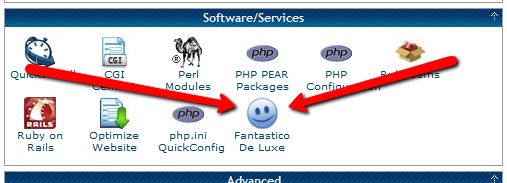
In this installment of the Make Extra Money series, I’m going to show you how to set up a WordPress site. I’m going to show you exactly what settings, plugins, and themes I use. I’m not going to get into writing posts today. That will be next time.
I use WordPress because it makes it easy to develop good-looking sites quickly. You don’t have to know html or any programming. I will be walking through the exact process using Hostgator, but most hosting plans use CPanel, so the instructions will be close. If not, just follow WordPress’s 5 minute installation guide.
Assuming you can follow along with me, log in to your hosting account and find the section of your control panel labeled “Software/Service”. Click “Fantastico De Luxe”.

On the Fantastico screen, click WordPress, then “New Installation”.
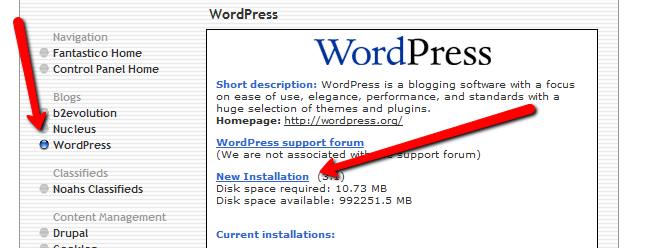
On the next screen, select your domain name, then enter all of the details: admin username, password, site name, and site description. If you’ll remember, I bought the domain http://www.masterweddingplanning.net. I chose the site name of “Master Wedding Planning” and a description of “Everything You Need to Know to Plan Your Wedding”.
Click “install”, then “finish installation”. The final screen will contain a link to the admin page, in this case, masterweddingplanning.net/wp-admin. Go there and log in.
After you log in, if there is a message at the top of the screen telling you to update, do so. Keeping your site updated is the best way to avoid getting hacked. Click “Please update now” then “Update automatically”. Don’t worry about backing up, yet. We haven’t done anything worth saving.
Next, click “Settings” on the left. Under General Settings, put the www in the WordPress and site URLs. Click save, then log back in.
Click Posts, then Categories. Under “Add New Category”, create one called “Misc” and click save.
Click Appearance. This brings you to the themes page. Click “Install Themes” and search for one you like. I normally use Headway, but before I bought that, I used SimpleX almost exclusively. Your goal is to have a simple theme that’s easy to maintain and easy to read. Bells and whistles are a distraction.
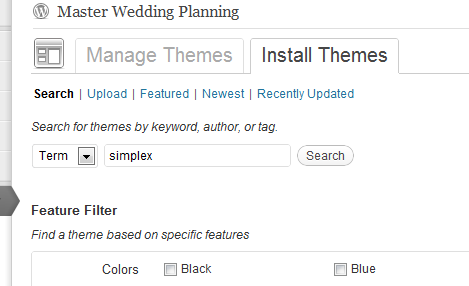
Click “Install”, “Install now”, and “Activate”. You now have a very basic WordPress site.
A plugin is an independent piece of software to make independent bits of WordPress magic happen. To install the perfect set of plugins, click Plugins on the left. Delete “Hello Dolly”, then click “Add new”.
In the search box, enter “plugin central” and click “Search plugins”. Plugin Central should be the first plugin in the list, so click “install”, then “ok”, then “activate plugin”. Congratulations, you’ve just installed your first plugin.
Now, on the left, you’ll see “Plugin Central” under Plugins. Click it. In the Easy Plugin Installation box, copy and paste the following:
All in One SEO Pack Contact Form 7 WordPress Database Backup SEO SearchTerms Tagging 2 WP Super Cache Conditional CAPTCHA for WordPress date exclusion seo WP Policies Pretty Link Lite google xml sitemaps Jetpack by WordPress.com
Click “install”.
On the left, click “Installed Plugins”. On the next screen, click the box next to “Plugins”, then select “Activate” from the dropdown and click apply.
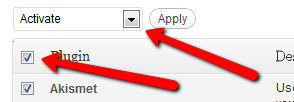
Still under Plugins, click “Akismet Configuration”. Enter your API key and hit “update options”. You probably don’t have one, so click “get your key”.
The only tool I worry about is the backup. It’s super-easy to set up. Click “Tools”, then “Backup”. 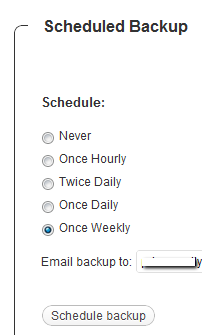
Scroll down to “Schedule Backups”, select weekly, make sure it’s set to a good email address and click “Schedule Backup”. I only save weekly because we won’t be adding daily content. Weekly is safe enough, without filling up your email inbox.
There are a lot of settings we’re going to set. This is going to make the site more usable and help the search engines find your site. We’re going to go right down the list. If you see a section that I don’t mention, it’s because the defaults are good enough.
Set the Default Post Category to “Misc”.
Visit this page and copy the entire list into “Update Service” box. This will make the site ping a few dozen services every time you publish a post. It’s a fast way to get each post indexed by Google.
Click “Save Changes”.
Uncheck everything under “Email me whenever…” and hit save. This lets people submit comments, without actually posting the comments or emailing me when they do so. Every once in a while, I go manually approve the comments, but I don’t make it a priority.
Select “Custom structure” and enter this: /%postname%/
Click save.
Set the status to “Enabled”, then fill out the site title and description. Keep the description to about 160 characters. This is what builds the blurb that shows up by the link when you site shows up in Google’s results.
Check the boxes for “Use categories for META keywords” and “Use noindex for tag archives”.
Click “Update Options”.
Check the boxes to remove each of the dates and set the alt text to “purpose” or something. This will suppress the date so your posts won’t look obsolete.
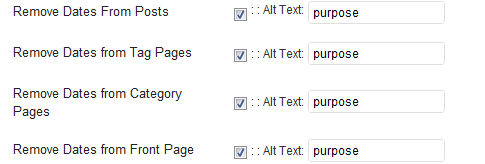
This plugin reinforces the searches that bring people to your site. It’s kind of neat. Skip the registration, accept the defaults and hit save.
Scroll to the bottom and click import. We’ll come back to this.
Select “Caching On” and hit save.
Across the top of the screen should be a giant banner telling you to connect to WordPress.com and set up Jetpack. You’ll need an account on WordPress.com, so go there and set one up. After authorizing the site, you’ll be brought back to the Jetpack configuration screen. Click “Configure” under “WordPress.com Stats”. Take the defaults and hit save.
On the contact configuration page, copy the code in the top section. You’ll need this in a moment.
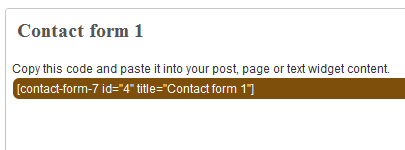
Now, we going to create a couple of static pages. On the left, click “Pages”, then “Add new”.
Name the first page “Contact” and put the contact form code in the body of the page. Hit publish.
Under Appearance, click “Menu”. Enter a menu name and hit save.
Then, under “Pages”, click the box next to “Contact”, “Disclaimer”, and any other policies you’d like to display. Hit save.
Also under Appearance, click “Widgets”. This is where you’ll select what will display in the sidebar. All you have to do is drag the boxes you want from the middle of the page to the widget bar on the right. I recommend Text, Search, Recent Posts, Popular Search Terms and Tag Cloud. In the text box, just put some placeholder text in it, like “Product will go here”. We’ll address this next time.
We’re not going to worry about getting posts in place, yet. That will be the next installment. However, the steps in the next installment could take 2 weeks to implement, and we want Google to start paying attention now. To make that happen, we need to get a little bit of content in place. This won’t be permanent content. It’s only there so Google has something to see when it comes crawling.
To get this temporary, yet legal content, I use eZineArticles. Just go search for something in your niche that doesn’t look too spammy.
Then, click “Posts”, then delete the “Hello World” post. Click “Add new”. Copy the eZine article, being sure to include the author box at the bottom, and hit publish.
To see your changes, you may have to go to Settings, then WP Cache and delete the cache so your site will refresh.
Congratulations! You now have a niche blog with content. It’s not ready to make you any money, yet, but it is ready for Google to start paying attention. In the next installment, I’ll show you how I get real unique content and set it up so Google keeps coming back to show me the love.
This is a guest post.
If you’ve previously heard of tax-sheltered annuity plans but are unsure of what they are, let this guide help you. Here’s what you need to know about tax-sheltered annuity plans.
First things first, what are tax-sheltered annuity plans? A tax-sheltered annuity plan, or a 403(b) plan, is a retirement plan for some employees of various institutions to participate. This plan allows employees to contribute a portion of their salary to the plan. The employer may also contribute to the employee’s plan.
Eligible Code Section 501(c)(3) employees tax-exempt organizations may participate, an employee of a public school, a state college, or a university, and eligible employees of churches. Employees of public school systems organized by Indian tribal governments, Ministers employed by Code Section (501)(c)(3) organizations, and self-employed ministers may also participate. Ministers must be employed by organizations that are not Code Section 501(c)(3) tax-exempt organizations, and they must function as ministers in their day-to-day professional responsibilities with their employers.
In a 403(b) plan, contributions are tax deductible. Taxes are paid on distributions in retirement, which is when a lot of people are in a lower tax bracket. As mentioned earlier, employers can match 403(b) contributions on a pretax basis. Loans can be taken against a 403(b) plan, which will help in certain situations, like buying your first home.
In a 403(b) plan, you can have several types of contributions:
Absolutely. The 403(b) plan must allow allow employees to make elective deferrals under the plan, but under the universal availability rule, if the employer permits one employee to defer salary by contributing it to a 403(b) plan, they must extend the offer to all of their employees. The only exceptions are employees who would contribute less than $200 annually, those employees who work less than 20 hours a week, employees who participate in a 401(k) or 457(b) plan, or students performing services that are described in Code Section 3121(b)(10).
Employees may withdraw from the 403(b) plan when the reach the age of 59 and a half, have a severance from employment, have a financial hardship, or become disabled. Money can also be taken out if an employee passes away. The employee will have to pay taxes on the amount of the distribution that was not from designated Roth or after-tax contributions, and they may have to pay an additional ten percent early distribution tax.
Yes. Contract exchanges with a non-payroll slot vendor are permitted only if the plan permits it, the accumulated benefit after the exchange is, at the very least, the same as before the exchange, if the employer and the non-payroll slot vendor agree to share information regarding the plan’s terms, if any pre-exchange benefit restrictions are maintained after the exchange, and if the vendor complies with the terms outlined in the plan.
As of 2013, the maximum combined amount that an employer and an employee can contribute to a 403(b) plan is $51,000. That number may go up, depending on the annual cost-of-living.
If the plan allows, an employer can contribute up to the annual limits for an employee’s account for up to five years after the date of severance. No portion of the contributions can come from money that was due to be paid to the former employee, and these contributions must cease if the employee passes away.
There’s much more to learn about a 403(b) plan, but these are the basics. Does your company have a 403(b) plan?
 budget” width=”300″ height=”185″ />
budget” width=”300″ height=”185″ />Over the next few weeks, I will be going over my budget in detail.
The first section is income, but that’s straightforward. A line for each income source, bi-weekly, monthly and annual totals. Simple.
Before we start, a word on the organization. There are five columns:
The first section I am actually going to address is discretionary spending.
Initially, we used a “virtual envelope” system. We had a spreadsheet and every time something was spent in this category, we entered the amount and stopped when the category was spent. Didn’t work. We are going on a pure, cash-only system as of the first of the year. No money, no spendy.

Last night, a friend called me up and asked me to accompany him to the police station. The police had knocked on his door, waking up his girlfriend while he was out. When he called, they wouldn’t tell him why they wanted to talk to him. Was it an ex trying to make his life difficult or one of his employees getting investigated?
This friend has had a number of interactions with the police, but never learned how to deal with them. Before we left, I gave him a crash course in “stay out of jail”.
During an investigation, you are a suspect. They are looking for a conviction. There may be a “good cop” trying to “help you out”, but he is trying to put you in jail. “Protect and Serve” doesn’t mean you. In general, it means society as a whole. During an investigation, they are serving the interests of the prosecutor.
Generally, they are going to look at you–as the target of their investigation–as the enemy. This is normal. They spend all of their time dealing with scumbags and s***heads. Naturally, they start to assume that everyone who isn’t a cop will fall into one of those categories.
Don’t get pissed when they act rude, ignore you, or anything else. It isn’t a lack of professionalism, it’s just a different profession. They are using interrogation techniques that have been proven successful. Ignore it and focus on Lesson 2.
It will feel wrong to disobey the authority you’ve been taught your entire life to obey. You’re not. You are standing by your rights. Nobody cares about your future more than you do. Certainly not the guy investigating you.
The second a police interaction starts to look like they are investigating you, demand your lawyer, then see Lesson 4. When you demand an attorney, they stop asking you questions. You can take it back and start talking, so again, see Lesson 4. It’s your attorney’s job to talk to the police and, if necessary, the media. It’s your job to talk to your attorney.
You don’t need an attorney ahead of time. Criminal defense attorneys are used to getting calls at 3AM. It’s part of their job. If you have a low enough income as defined by whatever jurisdiction you are being investigated in, you can get a public defender. That’s better than nothing, but I’d prefer to hire a professional shark, even if it means mortgaging my future. Prison is a big gamble.
The right of the people to be secure in their persons, houses, papers, and effects, against unreasonable searches and seizures, shall not be violated, and no Warrants shall issue, but upon probable cause, supported by Oath or affirmation, and particularly describing the place to be searched, and the persons or things to be seized.
“Officer, I do not consent to any search and I would like to speak to my attorney.” Remember this. Memorize it.
They need probable cause, a warrant, or permission to search your stuff. Never agree to it. Don’t stop them if they search anyway, but never, ever agree to a search. If the search is done improperly, your lawyer(see Lesson 2) will get the results of that searched thrown out.
It isn’t possible to get into more trouble for standing by your rights. There is no crime on the books anywhere in the US called “Refused Consent to Search”. Your day will not go worse because you defended your Constitutional rights.
I know a few defense attorneys. According to them, most of the people in jail either committed a crime in front of a bunch of witnesses, or they talked their way into jail. Shut up. You’ll want to either justify or defend yourself depending on the circumstances. Don’t. Shut up. It may be one of the hardest things you ever do, but keep your mouth closed. The only thing worse than talking is lying. Don’t lie, just keep quiet.
There is nothing you are going to say that will make your interrogator invite you home for Christmas. He isn’t your friend, you won’t meet his parents, you aren’t going to his birthday party. There is absolutely no win in talking to him. Shut up. The answer to every question is “Lawyer.” If the only thing you say babble is “Lawyerlawyerlawyerlawyerlawyerlawyer”, you’re probably not going to do too badly.
In your car, the dynamic changes a bit, but the principles don’t. When a cop pulls you over, don’t argue. You can’t win an argument with a cop on the side of the road. Be nice, be polite, and as soon as possible, pull into a parking lot and take as many notes about the encounter as you can. If you are planning to fight whatever he pulled you over for, don’t give him any reason to remember you or spin his official report to make you look bad. Again, shut up. Catching a theme?
If you are being investigated by the police, your future–or some part of it–is on the line. While you are gambling with your criminal record and your freedom, don’t forget that you are an amateur in this arena. The police, the prosecutor, and your attorney are the professionals and the stakes can be huge. Keep your mouth shut, call your attorney, and thank me later.